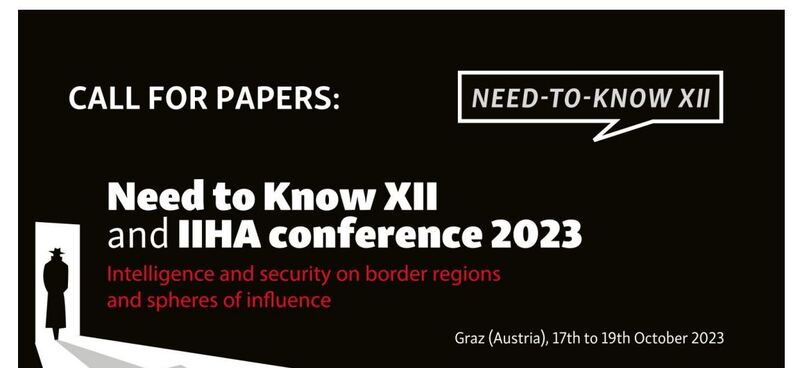Borders were an important focus for intelligence activities throughout the Cold War, not only during diplomatic and military conflicts. Intelligence and security activities at borders were evident in a variety of ways, from single border incidents up to diplomatic and even military conflicts.
Besides the borders themselves, some territories became strategically important spheres of influence. As seen from the Cold War perspective, countries like Austria, West-Germany or Turkey, as states along the “Iron Curtain”, played a special role as “hubs” for Eastern/Western intelligence. Austria, in particular, gained the reputation as an important meeting place, theatre of operations, and “hub” for intelligence services from both sides.
As this year’s conference will take place in Austria, the aim of the conference is to look at intelligence and security on borderlines, border regions, regional and transregional spheres. The temporal focus will be on the Cold War and after 1989/91, but papers dealing with the topic in earlier stages are also welcomed. Furthermore, the papers do not have to be limited to historical papers, they can also cover studies and research on current events and topics, like the conflict in Ukraine, for example.
We hereby invite submissions for papers or proposal for panels for this year’s Need to Know conference, which will take place at the castle of St. Martin near the city of Graz, Austria.
This conference welcomes submissions on this topic, especially when dealing with one of these questions:
• What role did border regions and adjacent territories play in intelligence and security planning during the Cold War and beyond?
• How did the role of border regions and spheres of influence change during and in the aftermath of the Cold War?
• How did intelligence and security agencies cooperate in such regions?
• What was the impact of intelligence and security activities in these regions for the ongoing Cold War in Europe?
• What future possibilities exist for research on this aspect of Cold War intelligence history?
• To what extent did these activities have consequences for post-Cold War developments?
The Need to Know conferences aim to stimulate research and discussions on the history of intelligence, with a special focus on the Cold War and the post-Cold War Era. A core focus is to explore new information and new interpretations following the opening of archives in East and West.
Due to the fact that this year’s conference will take place in Austria, submissions relating to Central Europe, the role of neutral countries in such developments and scenarios, and activities along the Iron Curtain as one of the central border regions of the Cold War are particularly encouraged.
The conference language is English.
The conference is organised by the Ludwig Boltzmann Institute for Research on Consequences of War/University of Graz together with the Institute of National Remembrance – Commission for the Prosecution of Crimes against the Polish Nation, the International Intelligence History Association (IIHA), the Center for Cold War Studies of the University of Southern Denmark; Norwegian Aviation Museum, the King’s Intelligence and Security Group, King’s College London; the Estonian International Center for Defence and Security, and in partnership with the International Journal of Intelligence and Counterintelligence. The conference is also organised with the local partnership of the Austrian Center for Intelligence, Propaganda and Security Studies (ACIPSS) in Graz.
Accommodation and meals will be covered for presenters. The conference may also contribute to travel expenses upon application and subject to budgetary restrictions.
The deadline for paper proposals is June 5th, 2023.
The submission should include:
• An abstract of 500-700 words in English;
• A biographical note listing major professional accomplishments (250 words, in English).
The Conference Organisational Committee will notify selected speakers by mid-July 2023.
The conference language is English.
***
Submissions and additional questions should be sent to:
Young Researcher Forum:
For the 2023 conference, the IIHA invites all participants to discuss practices of intelligence research with a round table of junior researchers. The aims of the discussion are not finished projects or results, but rather the ways and challenges of intelligence research. Presenting work in progress, the issues discussed will be differences of intelligence history to other historical topics, the challenge of finding adequate research questions and sources, and the question if or how scholars are influenced by the special conditions of intelligence research.
For the round table, junior researchers are invited to give short statements (5-7 min) addressing some or all of the following points:
a) How do you find a research question in intelligence history? Is there a difference to other areas of research?
b) Sources for intelligence history can be very divers, but sometimes you do encounter difficulties in getting access or in understanding such sources. How do you find your material and is there a formula for working with intelligence sources?
c) In how far are intelligence research and its outcome influenced by the conditions of historical research Do historians sometimes look to much for “James Bond” and not enough for “Moneypenny”?
d) Based on your research experience, what personal comments / questions would you like to give / raise, e. g. regarding research questions, problems?
***
Please submit your paper proposal abstract to the young researcher forum (200-300 words) by email to the IIHA Executive Director Thomas Wegener Friis at exec_director@intelligence-history.org or twfriis@sdu.dk
